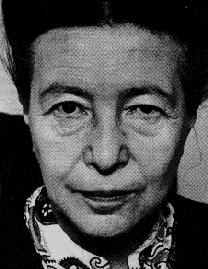Overview:
This course is an advanced survey of recent developments in feminist
philosophy, focusing on the unique nature of "theory"
in feminist thought and on intersections between feminist philosophy
and other developing disciplines within feminism. Topics include
the definitions of gender and sex, ethical theories, feminist
epistemologies, disputes about essentialism, and assessments of
the position of women in the history of philosophy. We will study
and compare the assumptions and aims of various types of feminism
(radical, socialist, liberal, psychoanalytic, French, multicultural,
"Third Wave," etc.). No philosophy background is assumed,
but readings will typically be fairly long and abstract. The class
will involve roughly 50% lecture and 50% class discussion in small groups; grading
will reflect the requirements of regular reading, writing, and group
participation. For details, see below.
Required texts
Feminist Thought, Rosemary Tong.Westview Press, 1998. ISBN 0-8133-3295-8
Feminism and Philosophy,
Rosemary Tong and Nancy Tuana, eds. Westview Press, 1995. ISBN 0-8133-2213-8
Listen Up: Voices from
the Next Feminist Generation, New Expanded Edition, Barbara Findlen, ed.
Seal Press, 2001. ISBN 1-58005-054-9
Recommended Texts
Philosophy of Woman, Mary Mahowald, ed.
Course Outline and Requirements in More Detail
There will be six units in the course, covering different varieties
of philosophical approaches to and bases for feminism. These
are covered to some extent in chronological order, that is, in
relation to the successive waves of theorizing that have emerged
within feminist thought. The primary text for these units is
Rosemary Tong's Feminist Thought (FT). A key reading for
each unit will be assigned from the collection of original sources,
Feminism & Philosophy (F&P), edited by Nancy Tuana
and Rosemary Tong. Because "third wave feminism" is
the newest variety of feminist thought, as we proceed, we will
also read selections from the anthology Listen Up: Voices
from the next feminist generation (LU), edited by Barbara
Findlen. We will use these readings to get a different perspective
on each of the theoretical approaches we are considering as we
proceed.
Requirements:
1. Students must write a short, informal
paper almost each week in reaction to the assigned readings. More specifics
will be announced in class with due dates and topics made clear at the start
of every two-unit section of the course. Some papers will be exegesis papers explaining
the ideas or arguments of complicated articles; others will be "response
papers" discussing any personal response to assigned essays from the
Listen Up volume. Credit for these papers is P/F. The relevant
score for this part of your final grade will be based on the number of papers
successfully completed.
2. Three Take-Home Exams, each covering two units of the course.
These will be graded with letter grades
by the professor and will be typed, essay-format papers. Take-Home Topics
will be announced a week in advance of the due date. The final take-home will be
due on Tuesday, December 7th..
3. (Required for Honors credit
only) An Independent research paper,
five pages, variable format, on a feminist author, artist, or theorist.
Recommended: Gayatri Spivak, bell hooks, Adrienne Rich, Elizabeth Spelman, Cherrie
Moraga and Gloria Anzaldúa, Iris Young, Martha Nussbaum. Class report on
research due November 30th.
Grading: Unit Papers 20% each; Informal
Papers 30% total; Class Participation 10%.
This plan that may be altered as we proceed, depending
on how the schedule seems to work and on student reactions to
the readings and other assignments. I will try to keep the latest
version on the course web site.
Outline and Assignment Schedule for Units 1 and 2
Unit 1. Liberal Feminism
Main reading: FT Chapter 1, pp. 10-44.
Primary source reading: Melissa Butler in F&P, pp. 27-47
Key names: Wollestonecraft, Hume, Mill, Taylor, Friedan, Baier, Nussbaum
Third Wave reading: Essays in LU, pp. 3-47
Unit 2. Radical Feminism
Main reading: FT Chapter 2, pp. 45-93
Primary source reading: Catharine MacKinnon in F&P, pp.
134-161
Key names: Firestone, Dworkin, MacKinnon, Frye, Hoagland
Third Wave reading: Next six essays, LU pp. 51-100
Outline and Assignment Schedule for Units 3 and 4
Unit 3. Marxist and Socialist Feminism
Main reading: FT Chapter 3, pp. 94-129.
Primary source reading: Heidi Hartmann in F&P, pp. 104-128
Key names: Angela Davis, Ann Ferguson, Nancy Hartsock, Marx,
Engels
Third Wave reading: Next six essays, LU pp. 103-149
Unit 4 Psychoanalytic and Gender Feminism
Main reading: FT Chapter 4, pp. 130-172
Primary source reading: F&P, Chapters
4 and Chapter 7
Key names: Freud, Lacan, Horney, Deutsch, Mills, Chodorow, Dinnerstein, Noddings,
Gilligan, Gallop
Third Wave reading: Next six essays, LU pp. 153-205
Outline and Assignment Schedule for Units 5 and 6
Unit 5 Multicultural and Global Feminism
Main reading: FT Chapter 7, pp. 212-245
Primary source reading: Patricia Hill Collins in F&P, pp.
526-547
Key names: Gayatri Spivak, Angela Davis, Patricia Williams, Patricia
Hill Collins, bell hooks, Adrienne Rich, Elizabeth Spelman, Cherrie
Moraga and Gloria Anzaldúa
Third Wave reading: Next six essays, LU, pp. 209-250
Unit 6 Postmodern Feminism
Main reading: FT Chapter 6, pp. 193-211.
Primary source reading: Irigaray in F&P, pp. 457-466
Key names: Judith Butler, Luce Irigaray, Donna Haraway, Patricia Williams
Third Wave reading: Next six essays LU, pp. 253-293
Web Resources
Society for Women in Philosophy Web Page
http://www.uh.edu/~cfreelan/courses/FemPhil/
Last updated August 23, 2004
